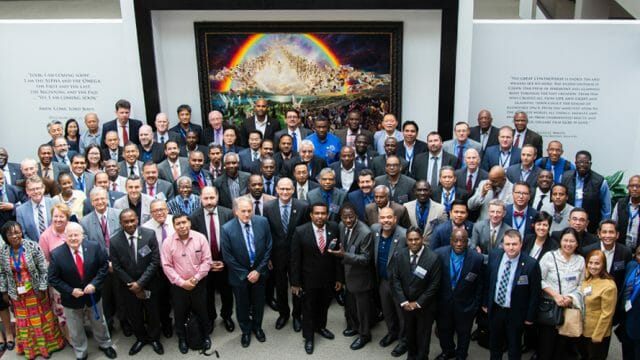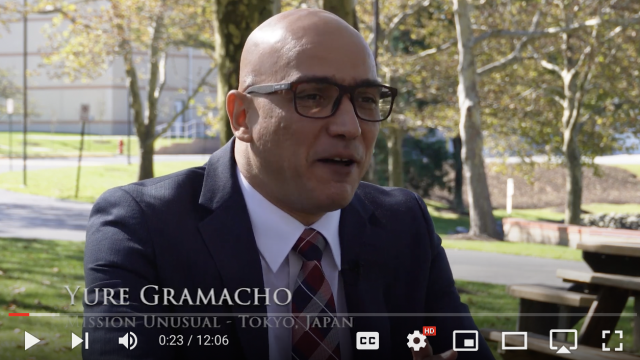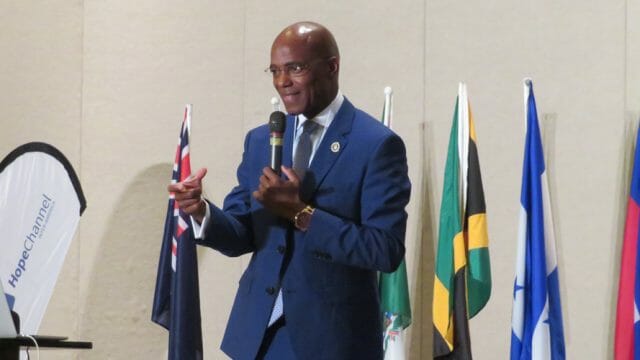New tools and resources seek to help every person to participate, organizers say.

Operating under the theme “Think Differently. Think Possibilities,” the team at Adventist Possibility Ministries (APM) is organizing new initiatives to make the 2022 General Conference Session more accessible to special needs communities than ever before, leaders said.
Although scheduled to be held at America’s Center in St Louis, Missouri, United States, June 6-11, the Session will have a strong online focus, with attendees able to livestream business sessions and attend a virtual exhibition hall from the comfort of home.
Thanks to the Session’s largely digital format, APM has organized Kahoot games, networking events, and a digital booth with resources for local churches. It has facilitated new accessibility features in the online platform to make navigation as easy as possible for all guests. APM leaders also plan to propose a significant addition to the Seventh-day Adventist Church Manual during the business session.
“For far too long we’ve thought of disabilities rather than possibilities,” Larry Evans, assistant to the General Conference (GC) president for APM. “We are out to change the way we think not only about ‘them,’ but ourselves and others. The 1.2 billion people that Adventist Possibility Ministries represents is about 15 percent of the world’s population. We represent one of the largest people groups in the world.”
APM Activities at the GC Session
APM is hosting two Kahoot games on June 8 — one at 6:00 a.m. and another at 12:00 p.m. Central Daylight Time, with a strong focus on educating the general Adventist population about the special needs community. Prizes will be awarded to the winners.
“This timeframe is intentional,” GC virtual events and Adventist collective consultant Sharon Aka explained. “It’s such a great time internationally; it’s morning or evening for pretty much everyone, so we hope this encourages lots of people to attend.”
For the first time in history, two scheduled online networking opportunities for people with various disabilities will be available each day of the Session. The deaf will have a breakout group where sign language will be active, while others will meet in other breakout groups.
“For me this is huge because it shows that this virtual event is somewhere that people with different disabilities — who may be hesitant or unable to travel — can be included and supported in a way that hasn’t been done before in a virtual environment,” Aka said.
While the networking events are still being planned in terms of topic and format, there will likely be a focus on positivity and gratitude when facilitating discussion. “As in Pentecost, there seems to be a common language because there is a single motivation to communicate gratitude,” Evans said. “Gratitude to God for who He is and what He is doing.”
APM will have a booth in the Virtual Exhibition Hall, filled with resources and information for each of its seven sectors: bereavement for spousal loss; the blind and low vision; caregivers; the deaf and hard of hearing; mental health and wellness; orphans and vulnerable children; and physical/mobility health and wellness.
According to Evans, the booth will have a questionnaire that Adventist churches around the globe can use to evaluate their accessibility — both in terms of physical access and attitudinal access, as well as crossword puzzles and other activities to raise awareness of the seven ministries of APM. “The local church must learn to respond to those with special needs,” he said.
Proposed Change to the Church Manual
An addition to the Church Manual will be proposed at GC Session, with the intent to make Possibility Ministries significant at a local church level. To facilitate this, APM has been working with Adventist Learning Community to create a new program to train churches in how to make services and ministries more accessible.
“Right now, it is in the hands of the translators,” Evans explained. “It has gone through several committees already. The proposal suggests that each church have a Possibility Ministries leader who will serve on the church board. The Adventist Learning Community online course is a training program to assist local churches to develop Possibility Ministries leaders as recommended by the next Church Manual.”
Accessible Online Platform
Just like the Adventist Virtual Global Camp Meeting, which was held May 19-23, 2021, the Virtual Exhibition Hall at the Session this year will be an interactive and immersive digital experience. With a specially designed virtual environment resembling an exhibition hall, and featuring Adventist signage, customized booths for each ministry, animated elements, and digital avatars, it is hoped that the experience will be inclusive and interesting for all attendees.
This year, elements of the virtual platform have been upgraded to cater for visitors with visual and hearing impairments or cognitive disabilities. This is happening because VFairs — the company specializing in virtual exhibitions that make the event possible — has increased its focus on accessibility. Specifically, its platform now features event navigation (all on-screen menus are now labeled clearly with functionality, and there are no popups or unexpected flashes or sounds to disrupt visitors) and color contrast (all virtual events can be customized to accommodate changes in color contrast so that all text can be read easily). It also includes adjustable text character size (assistive technology that allows on-screen fonts to be enlarged or reduced in size), page narrations (a headphone icon to click on that helps those with visual impairments to access information via the on-screen text narration to gain a fully immersive experience), and captioned webinars (closed-captioning options to make online events more convenient and accessible to all).
“I think it’s really important that we have these features,” Aka said. “For a long time, we’ve unintentionally marginalized this potentially vulnerable community because of how we present things. This new format creates one of the first opportunities for this community to fully participate. When things were held in person, it could be cumbersome for a lot of people, but now everyone can do this for themselves. They can turn on color correction or enlarge text. This creates equity, community, and opportunity.”








